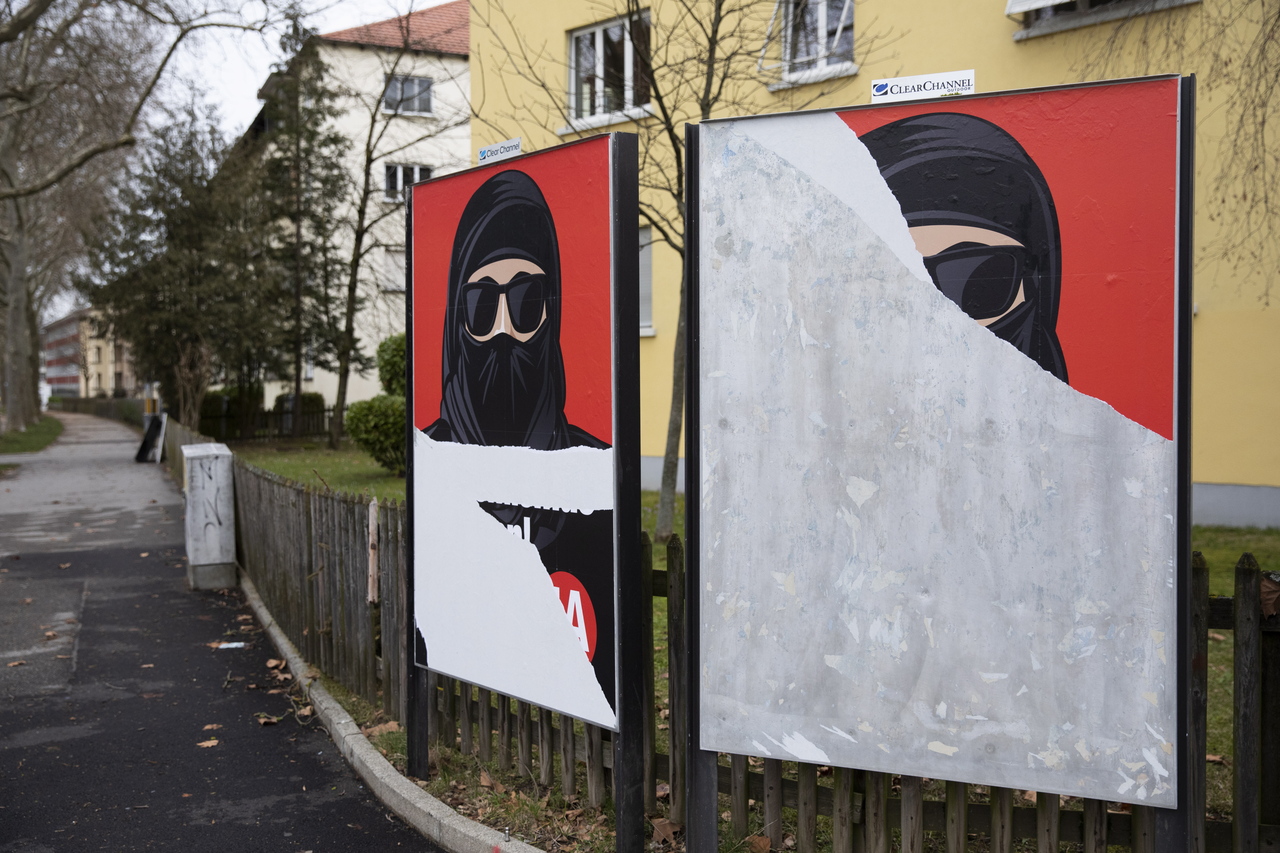Swiss voters agree to outlaw full facial coverings in public; narrowly back Indonesia trade pact
Sign up now: Get ST's newsletters delivered to your inbox

Torn campaign posters supporting the ban in Bern on Feb 4, 2021.
PHOTO: EPA-EFE
Follow topic:
ZURICH (REUTERS) - A far-right proposal to ban facial coverings in Switzerland won a narrow victory in a binding referendum on Sunday (March 7) instigated by the same group that organised a 2009 ban on new minarets.
The measure to amend the Swiss constitution passed by a 51.2-48.8% margin, provisional official results showed.
The proposal under the Swiss system of direct democracy does not mention Islam directly and also aims to stop violent street protesters from wearing masks, yet local politicians, media and campaigners have dubbed it the burqa ban.
"In Switzerland, our tradition is that you show your face. That is a sign of our basic freedoms," Walter Wobmann, chairman of the referendum committee and a member of parliament for the Swiss People's Party, had said before the vote.
He called facial covering "a symbol for this extreme, political Islam which has become increasingly prominent in Europe and which has no place in Switzerland".
The Central Council of Muslims in Switzerland called the vote a dark day for the community.
"Today's decision opens old wounds, further expands the principle of legal inequality, and sends a clear signal of exclusion to the Muslim minority," it said.
It promised legal challenges to laws implementing the ban and a fundraising drive to help women who are fined.
The proposal predated the Covid-19 pandemic, which has required adults to wear masks in many settings to prevent the spread of infection.
Two cantons already have local bans on face coverings.
France banned wearing a full face veil in public in 2011 and Denmark, Austria, the Netherlands and Bulgaria have full or partial bans on wearing face coverings in public.
Practically no one in Switzerland wears a burqa and only around 30 women wear the niqab, the University of Lucerne estimates. Muslims make up 5% of the Swiss population of 8.6 million people, most with roots in Turkey, Bosnia and Kosovo.
The government had urged people to vote against a ban.
"After the ban on minarets, a majority of Swiss voters has once again backed an initiative that discriminates against a single religious community and needlessly stirs up fears and division," Amnesty International said.
"The veiling ban is not a measure for women's liberation, but a dangerous symbolic policy that violates freedom of expression and religion."
Separately, Swiss voters narrowly approved a free trade agreement with Indonesia in a binding referendum on Sunday, with lower tariffs on palm oil imports the main issue in the national debate.
The vote was carried with a 51.7-48.3% margin, provisional official results showed, a closer result that opinion polls had suggested.
Switzerland signed the pact in 2018 together with the other European Free Trade Association members Iceland, Norway and Liechtenstein.
Parliament ratified the deal in 2019, but the "Stop Palm Oil" movement - backed by the Greens as well as environmentalist and anti-globalisation NGOs - called a referendum under Switzerland's system of direct democracy.
Under the FTA, both parties would gradually reduce or abolish import duties on industrial products. For palm oil, Switzerland will reduce tariffs by about 20%-40% for up to 12,500 tonnes per year, but only if sustainability standards are met.
Indonesia is the world's top producer of palm oil, which is used in cosmetics, food products and biofuels. Palm oil has faced scrutiny from green activists and consumers, who hold it responsible for forest loss, fires and worker exploitation.
The government recommended the FTA, saying it would give Switzerland's export-oriented economy better access to growth market Indonesia, while promoting more sustainable palm oil production as only certified oil could enjoy tariff reductions.
But the committee that organized the referendum said the deal would boost demand for cheap palm oil, destroying tropical forests and hitting Swiss rapeseed and sunflower oil production.

